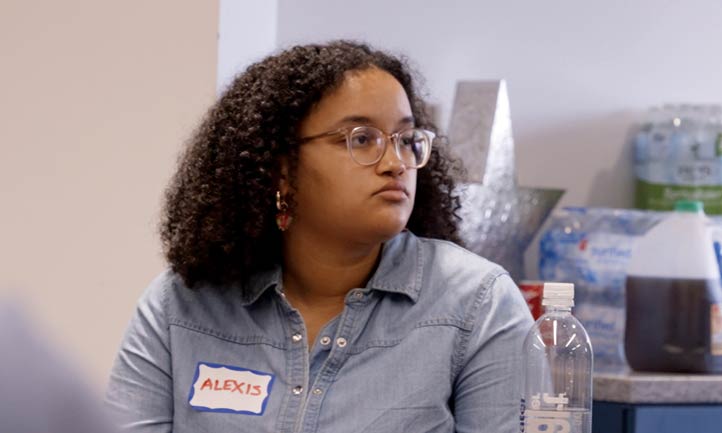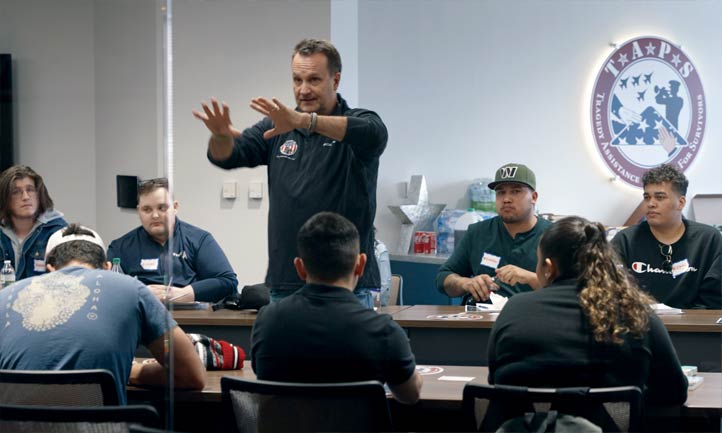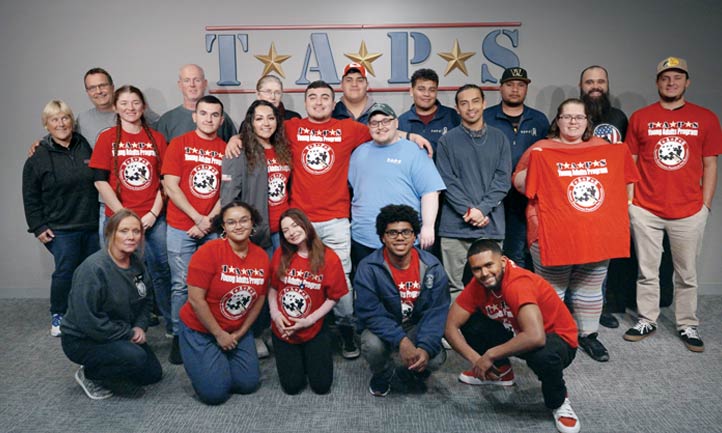The Heroes Journey: Telling My Story
Author: Alexis Saizon-Cowley
The following is an excerpt of Alexis' powerful story of suicide loss that she shared at The Heroes Journey storytelling workshop hosted at TAPS' National Headquarters in January. If you or someone you know is experiencing thoughts of suicide, you can contact the Suicide & Crisis Lifeline toll-free by dialing 988. If you lost a military or veteran loved one to suicide, you are not alone. TAPS is here for you with support and resources for your unique grief. Visit TAPS Suicide Loss Support to learn more.


My Story
On July 20, 2022, my day started with my stomach feeling like that little black, big-foreheaded alien was trying to claw its way to the surface. But, this was the first time I felt it finally found its way out.
I sat on the edge of my bed, staring at the security monitor mounted above my fridge. Lady, my mom’s Volvo, was gone. My mom had already left for work. I glanced at my phone. No messages appeared saying the usual, “Have a blessed day, Lexi and Veto, I love you,” in our group chat. That little black, big-foreheaded alien, now sticking out of my stomach, screamed that something was wrong. That feeling wasn’t new.
I got a call from my dad to come over seconds later. He needed to talk with me. Having a large property made it possible for me to have a house built near my mom and dad. I slowly made my way to their house. My dad was standing at our dining room table. With no hesitation, he quickly said, “Your mom and I are getting a divorce.” I wasn’t shocked.
My dad, Alveto Samuel Cowley II, my best friend, was an Army Ranger. He deployed multiple times, was a part of special operations, and worked for the U.S. Embassy. He did so much for our country that I am proud of…that my mother is proud of…that my family is proud of. However, like many veterans who served their country, my father brought back wounds from war.
My dad suffered from severe PTSD and multiple TBIs. He had broken his lower back; he had broken his neck twice; and he had depression. Bad habits came from his pain — pain that kept him stuck in the dark, pain that love alone could not save him from, pain that I alone could not save him from.
In our conversation on July 20, 2022, I tried to do what I always did — fix. I recognize our conversation was an argument, which I regret now that I know it was our last conversation. As the only daughter of my mom and dad, I felt like it was my duty to mediate. But that wasn’t my place. My only job was to be their child. But, I titled myself “Dr. Phil” for them, which I wish I did not do. The last thing I got to say to my dad was, “I love you, and we’ll get through this.”
Love alone could not fix my dad’s deep pain. He died by suicide later that day as a result of his wounds. But, as I am learning, the end of his pain became the beginning of my journey toward healing.


Learning to Tell My Story with TAPS and The Heroes Journey
During the Young Adults Heroes Journey Storytelling event, I was asked to pick an event in my life — a big moment that changed me. The story you just read, My Story, is what I shared on the last day of the event. I never thought I would be able to tell my story. The memory was still a fresh wound. What I found in sharing that moment was a feeling of relief.
What felt like a heavy weight to bear became lighter as the words of My Story swam from my mouth. Scott Mann, and everyone who helped me during the event, made me realize that stories of our experiences — no matter the context — draw a multitude of emotions out of the people listening. But they also draw emotions out of the storyteller. Scott Mann said something that really stuck with me, “Stories are alive; you feel them in your bones.”
I had written My Story and believed my emotions would not allow me to say it without looking at what I wrote, but the story was truly in my bones, and the more I let my emotions flow, the more my story came alive.
Because my father’s death was so recent, my journey with grief has, so far, been extremely difficult. I am also battling depression and anxiety through my grief journey. Before this event, I felt like I was managing everything, and I felt I did not need to bring up what I was struggling with. However, the more I vocalized to those trying to help me during the event, the more I felt I was really helping myself.
I grew confident in myself by the conclusion of the event. I understand now that there is nothing wrong with me, and I have the right to feel and share what I am feeling.
I realized I was not alone. Hearing the other stories made me realize that we are all hurting in some way. We are all trying to be better — to heal ourselves. And it was truly a beautiful thing to have witnessed others, as well as myself, do something believed to be impossible. In the Young Adults Heroes Journey Storytelling event, I saw it was possible to bear a wound to the world.
TAPS Young Adults Program
The TAPS Young Adults Program supports military survivors, like Alexis, ages 18 to 30, including all manners of loss and relationships. Young adults can join monthly conversations in online group meetings and one-of-a-kind, in-person events. View and register for any upcoming events or request information by emailing youngadults@taps.org.
Alexis Saizon-Cowley is the surviving daughter of MSG Alveto Samuel Cowley II, U.S. Army Retired.
Photos: Pexels and TAPS Archives
